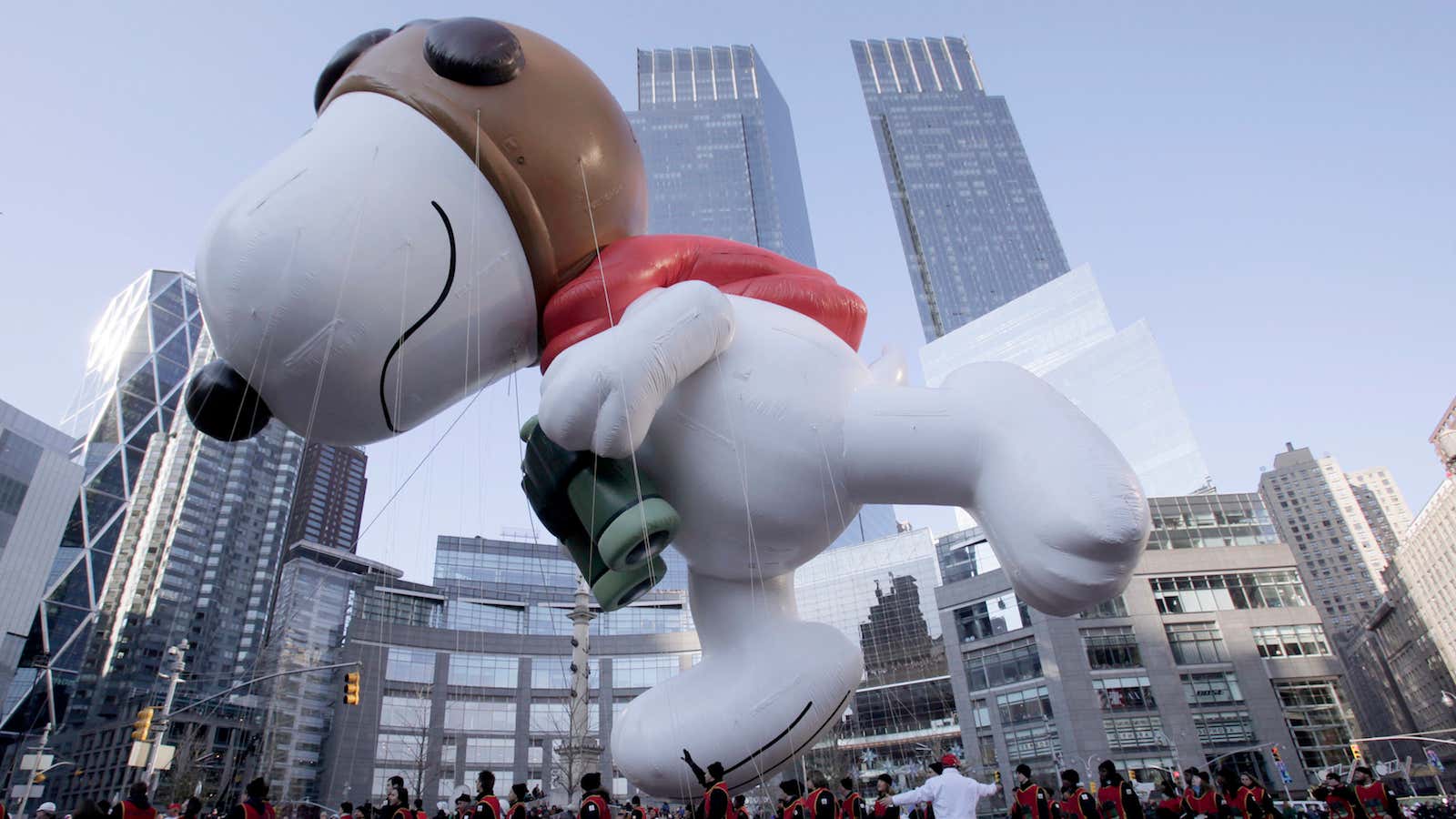One of the more thought-provoking pieces of cultural criticism of recent times, Kevin Wong’s “How Snoopy Killed Peanuts” about classic US comic strip Peanuts went viral over the weekend on the gamer site Kokatu. Indeed, we’re likely to see a lot more Peanuts-related dialog leading up to the November release of the 3-D animated The Peanuts Movie—or, as I like to call it, It’s the Uncanny Valley, Charlie Brown!
Wong accuses beloved cartoon beagle Snoopy of running Peanuts into the ground by hijacking the plot lines and otherwise stealing the thunder of other main characters, starting in the late 1960s. As a result, claims Wong, the comic strip—which ran from 1950 to 2000—degenerated into populist pap:
“As the strip progressed, the beagle hogged more and more of the spotlight in increasingly negative ways. And the intelligence and darkness of the strip, which once made it so distinctive on the comics landscape, was replaced by more mainstream, cutesy humor.”
It was Snoopy’s evolution from pet to anthropomorphized friend that heralded the cartoon’s decline, according to Wong.
I am here neither to bury Snoopy nor to praise him. But I have to point out that the second act of Peanuts—let’s say, the late 1960s to the early 1980s—was far superior to its early days (and to the final 20 years of the strip, which admittedly got boring). And Snoopy’s ascent from mute dog to novelist/WWI flying ace/Stanley Cup ice hockey player was actually quite integral to that golden period.
Take, for example, that novel Snoopy was always typing on the Remington atop his doghouse, the one that began with “It was a dark and stormy night.” Someone went through the Peanuts archives and assembled the bits and bobs of Snoopy’s manuscript from beginning to end. With a few turns of phrase, Snoopy’s magnum opus brilliantly captures the tone of every bad novel any aspiring writer has sent to me for critique.
For example: “Could it be that she was the sister of the boy in Kansas who loved the girl with the tattered shawl who was the daughter of the maid who had escaped from the pirates?” Not since Cervantes’s Don Quixote has there been such a spot-on sendup of pulp romances.
In comparison, the kind of humor Peanuts displayed in its earliest days isn’t that great. Wong claims that this, Peanuts’s very first strip, is what the ur-text of the comic ought to have been throughout its 50-year lifespan:
Sure, this kind of hostility was groundbreaking for a comic book; but it’s also bewildering. And the ones that weren’t pointlessly mean were overly cutesy—with the early Peanuts depicted as toddlers or babies, often in diapers or onesies. Take this 1952 strip with an infant Lucy Van Pelt kvetching in her playpen:
Tell me that’s not pure Family Circus drivel. And how can this ga-ga goo-goo stuff possibly compare to the later, greater iteration of Lucy as a swindling, unhelpful shrink?
If Snoopy was too happy for some to stomach, it was only to offset the increasing, brilliantly grim tenor of the comic.
Consider Charlie Brown’s mantras of the Peanuts’s later period: “*Sigh*” “My stomach hurts,” and “I’m depressed.” (In fact, Peanuts is literally where, as a child, I first learned the word “depressed.” I can’t believe my mom didn’t confiscate my Peanuts compilation books.) Or this howler from 1976, at the very pinnacle of Snoopy’s alleged selling-out period:
Does this seem like an annoyingly euphoric character to you? (Fun fact: Schultz was a lay Methodist minister.)
Contrary to Wong’s claims, Peanuts did not become more populist in its second act. It became downright Sartrean, as seen below. This scene is “l’enfer, c’est les autres” (hell is other people) in full color, man. And note that this is the Sunday supplement, the ones kids actually read.
This may or may not also explain why the French state-owned network France 3 created a series of one- to two-minute animated Peanuts shorts, each of which cover Peanuts comic strips (not a rehash of the old Peanuts TV specials). As the official French television network blog (link in French) wrote, “Les américains doivent être fous de jalousie [Americans must be crazy with jealousy].” It’s the perfect setting and adaptation for all the lugubrious Peanuts fans who went on to smoke and quote Jacques Lacan and listen to the Smiths.
Speaking of the Smiths, the Tumblr “This Charming Charlie” gets to the heart of what’s so inimitable about the later Peanuts, by replacing the original dialogue with Smiths lyrics. Note Linus’ cult-victim eyes. No way could you have done this with the early, baby Peanuts:
